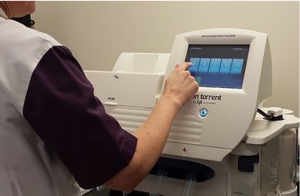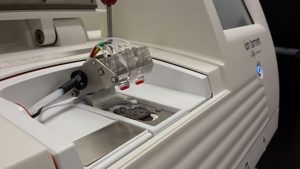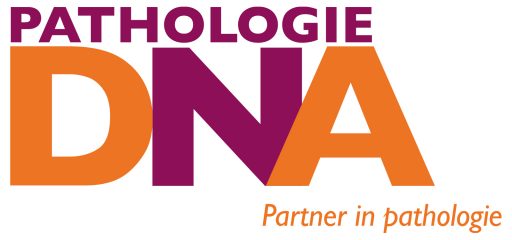Next Generation Sequencing
Prediction of therapeutic response based on genetic profile of het tumour
The key to targeted therapy
At Pathologie-DNA, we determine the aforementioned genetic tumour profile using next generation sequencing (NGS). For achieving this, we are in the possession of a ThermoFisher Ion GeneStudio S5 Prime System, which is used in combination with the ThermoFisher IonChef system for loading the sequencing chips. The advantages of NGS include:
- Mutation status of all relevant genes is determined in a single experiment
- A limited amount of tissue is sufficient
- Relatively low costs


Technic
Various standard gene panels can be requested (see the overview below). In addition to standard indicated genes, there is the possibility to determine mutations in additional genes that may become important in the near future and are currently being tested in clinical studies. Information about the gene panels can be found on the PALGA website. If you have any specific wishes or questions, then please consult with one of our molecular biologists; kmbp@jbz.nl.
Targeted therapy
- Lung carcinoma DNA: KRAS, EGFR, BRAF, ERBB2
- Lung carcinoma RNA: ALK, RET, ROS1, NTRK1/2/3, NRG1, MET exon 14 skipping
- Colorectal carcinoma: KRAS, NRAS, BRAF
- Melanoma: BRAF, NRAS, KIT
- Gastrointestinal stromal tumours: KIT, PDGFRA, BRAF
Differential diagnostics
- Relation of multiple tumours (question of second primary tumour or metastasis): whole Cancer Hotspotv2 Panel (50 genes, among which TP53 en CDKN2A)
- Papillary thyroid carcinoma: BRAF
- Desmoid tumour: CTNNB1
- Lymphoma: MYD88, CXCR4, BRAF, EZH2
- Langerhans cell histiocytosis: BRAF, MAP2K1
- Hairy cell leukemia: BRAF
